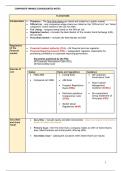Exam (elaborations)
Distinction Level Corporate Fiancee Exam Notes:
- Course
- Institution
Distinction-Level Corporate Finance Revision Notes: Well-Organized, Comprehensive, Exam-Friendly - BPP and ULAW For Sale: Exceptional Corporate Finance Revision Notes for Distinction-Level Success Are you currently studying the Corporate Finance module and searching for comprehensive and we...
[Show more]



